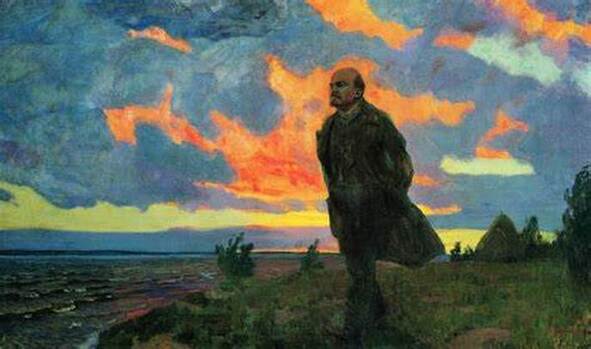|
11/26/2021 V. I. Lenin - Materialism & Empirio-Criticism. Commentary and Analysis (5/23). By: Thomas RigginsRead NowChapter One Section Three: The Principal Co-Ordination and "Naive Realism"Lenin now turns to two works by Avenarius, The Human Concept of the World and the Notes. He will give us the essence of the doctrine of the "Principle Co-Ordination" and its relation to our everyday notions of naive realism. Avenarius' thesis is that of, in his own words, "the indissoluble co-ordination of the self and the environment.” The self and the environment are always together, like a horse and carriage or love and marriage! The self is the central term and the environment is the counter term of this co-ordination. Avenarius thinks this doctrine leaves the belief in naive realism untouched, and Mach (Analysis of Sensations) thinks so as well. Lenin thinks this is nuts. In fact, he claims this view, which supposedly co-ordinates naive realism with the self (consciousness), is just warmed over Fichte. Lenin means Johann Gottlieb Fichte (1762-1814, 'The Father of German Nationalism'-- a dubious honor), an Idealist who wrote in 1801 that you should "Take care, therefore, not to jump out of yourself and to apprehend anything otherwise than you are able to apprehend it, as consciousness and the thing, as the thing and consciousness; or more precisely, neither the one nor the other, but that which only subsequently becomes resolved into the two, that which is the absolute subjective-objective and objective-subjective." The so-called newest philosophy was just a rehash, a century later, of early German Idealism. Now, what has this empirio-critical doctrine have to do with naive realism? According to Lenin, the naive realism (of "any healthy person") is "the view that things, the environment, the world, exist independently of our sensation, of our consciousness, of our self and of man in general." Not only does the world have an independent existence, human beings have knowledge about it because it interacts with our nervous system, also a part of the world, and reproduces images of itself of which we are conscious-- human consciousness being a higher order property of the organization of matter. "Materialism." Lenin says, “Deliberately makes the 'naive’ belief of mankind the foundation of its theory of knowledge." Lenin takes great pains to stress that this is not just the partisan view of diamat that he is pushing, but it is the standpoint of modern natural science and of scientists in general, even those who would not consider themselves followers of diamat. (Dialectical Materialism) As evidence for this view he turns to Wilhelm Wundt (1832-1920) 'The Father of Modern Psychology ' along with William James (1842-1910) who maintained the view that any given reality cannot be described without a reference to the "self" (Avenarius and company) is, in his words, "a false confusion of the content of real experience with reflections about it." Lenin also bolsters his argument by quoting from a 1906 article in Mind, still the leading English philosophy journal, by Norman Kemp Smith (1872-1958, best known for his translation of Kant's Critique of Pure Reason-- for many years the gold standard). After discussing Avenarius' theory of the principle co-ordination of the world of sense experience and the natural world of naive realism viewed as one of complexes of sensations, Smith concludes that Avenarius has failed completely to capture the meaning of naive realism as it is understood by realists [materialists]. Avenarius, Smith writes, "argues that thought is as genuine a form of experience as sense-perception, and so in the end falls back on the time-worn argument of subjective idealism, that thought and reality are inseparable, because reality can only be conceived in thought, and thought involves the presence of the thinker. Not, therefore, any original and profound reestablishment of realism, but only the restatement in its crudest form of the familiar position of subjective idealism is the final outcome of Avenarius' positive speculations." Lenin has pretty much made his main point in this section, which I will reiterate in a moment. He gives a few more examples of how mixed up Avenarius' views are (from W. Schuppe (1836-1913) and O. Ewald-- both of whom will be dealt with in later sections). He again says "it is important to note" that all attempts to combine materialism (realism) and subjective idealism a la Mach and Avenarius into some transcendental philosophy that includes them both is IN FACT an "empty, pseudo-scientific claim." Lenin says that "To build a theory of knowledge on the postulate of the indissoluble connection between the object and human sensation ('complexes of sensations' as identical with bodies; 'world-elements' that are identical both psychically and physically; Avenarius' co-ordination and so forth) is to land inevitably into idealism." And finally, to end this section, Lenin turns to R. Willy (1855-1918), the disciple of Avenarius, who has to admit that the attempt of his master to reconcile empirio-criticism and naive realism is a failure. Willy says you have to take the belief that Avenarius actually subscribed to naive realism "cum grano salis.”* Willy writes, "As a dogma, naive realism would be nothing but the belief in things-in-themselves existing outside man in their perceptible form." Willy thinks that is ridiculous, and perhaps it is in the way he formulated it. I mean, "in their perceptible form" is loaded-- there is an X out there but is that X 100% equal to how our senses perceive it? At any rate, Willy is forced to concede that Avenarius' book, The Human Concept of the World is one that "entirely bears the character of a reconciliation between the naive realism of common sense and the epistemological idealism of school philosophy. But that such a reconciliation could restore the unity and integrity of [basic] experience I would not assert." QED. Next we will go over Section 4 of Chapter One, "Did Nature Exist Prior to Man?" Believe it or not this is still a big issue, whether Nature only existed for 5 days prior to man, ex-president George W. Bush isn’t sure about this! -- a Yale graduate! *cum grano saltis = with a grain of salt. The phrase comes from Pliny the Elder's (24-79 A.D.) Naturalis Historia, regarding the discovery of a recipe for an antidote to a poison. In the antidote, one of the ingredients was a grain of salt. Threats involving the poison were thus to be taken "with a grain of salt" and therefore less seriously.-- Wikipedia AuthorThomas Riggins is a retired philosophy teacher (NYU, The New School of Social Research, among others) who received a PhD from the CUNY Graduate Center (1983). He has been active in the civil rights and peace movements since the 1960s when he was chairman of the Young People's Socialist League at Florida State University and also worked for CORE in voter registration in north Florida (Leon County). He has written for many online publications such as People's World and Political Affairs where he was an associate editor. He also served on the board of the Bertrand Russell Society and was president of the Corliss Lamont chapter in New York City of the American Humanist Association.
0 Comments
Leave a Reply. |
Details
Archives
January 2022
Categories |


 RSS Feed
RSS Feed